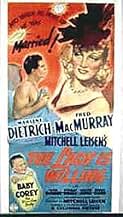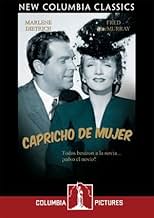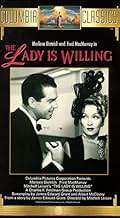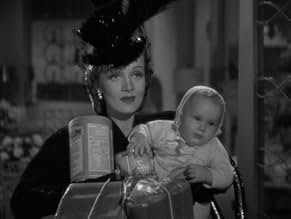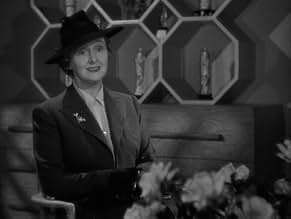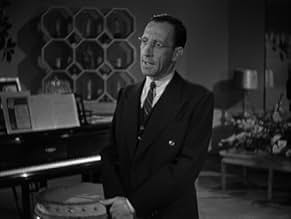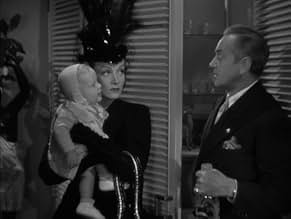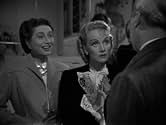IMDb RATING
6.3/10
867
YOUR RATING
In order to adopt an abandoned baby, an actress arranges a marriage of convenience with a doctor.In order to adopt an abandoned baby, an actress arranges a marriage of convenience with a doctor.In order to adopt an abandoned baby, an actress arranges a marriage of convenience with a doctor.
Eddie Acuff
- Patrolman Murphy
- (uncredited)
Ernie Adams
- Doorman
- (uncredited)
Helen Ainsworth
- Interior Decorator
- (uncredited)
Featured reviews
Whatever faults THE LADY IS WILLING has can be traced immediately to the script. Despite this, Mitchel Leisen's direction guides MARLENE DIETRICH and FRED MacMURRAY through their paces and gets some very good performances from both of them. Marlene, in particular, is surprisingly effective playing a naive, bossy, and very "dumb" Broadway actress who casually walks off with a baby simply because it's cute and she can afford to take care of it.
Complications arise, of course, when it's discovered that she's the woman in the screwy hat who took the child away from the scene of an accident. MacMurray is the handsome doctor she calls when she needs help in supervising the child and from then on the story veers between comedy, romance and even drama toward the end.
Dietrich is lovingly photographed, perfectly lit by an astute cameraman no matter what the situation is and glamorously gowned throughout. MacMurray is an old hand at screwball comedy and is thoroughly adept at handling his bumbling chores with his usual expertise.
A couple of good-natured twins were used for all of the baby's scenes and Dietrich seems to really care about how she interacts with the infant. It's an unusual role for her and she demonstrates an ability to toss off screwball dialog with the best of them.
This sort of fluff is given above average handling by Leisen and his stars, although the material itself is decidedly below par screwball comedy that turns maudlin toward the end.
Complications arise, of course, when it's discovered that she's the woman in the screwy hat who took the child away from the scene of an accident. MacMurray is the handsome doctor she calls when she needs help in supervising the child and from then on the story veers between comedy, romance and even drama toward the end.
Dietrich is lovingly photographed, perfectly lit by an astute cameraman no matter what the situation is and glamorously gowned throughout. MacMurray is an old hand at screwball comedy and is thoroughly adept at handling his bumbling chores with his usual expertise.
A couple of good-natured twins were used for all of the baby's scenes and Dietrich seems to really care about how she interacts with the infant. It's an unusual role for her and she demonstrates an ability to toss off screwball dialog with the best of them.
This sort of fluff is given above average handling by Leisen and his stars, although the material itself is decidedly below par screwball comedy that turns maudlin toward the end.
for the self irony of Dietrich performance. for the nice story and air of far age of cinema. for inspired cast. and, sure, for the respect for recipes of romantic comedy. it is not a link from chain of fashion of art. few sparkles, a seductive Dietrich, mixture of love balloons and fine humor, the dramatic small slice and the touching solutions to create identity in a ocean of clones, all is good reason to see it and, in a measure or other, to love it. because it is almost magic like many films from that period. because the acting is smart and the game of nuances not uninspired. because, after war of blockbusters, this film has the gift to be comfortable. and for occasion to travel in time. and discover than life is beautiful.
THE LADY IS WAITING (Columbia, 1942), under the direction of Mitchell Leisen, pairs Marlene Dietrich (on loan from Universal) and Fred MacMurray (from Paramount) for the only time. Nearly forgotten, and bearing no relation to the 1934 British-made movie of the same name starring Leslie Howard, the film itself offers the diverse Dietrich an opportunity to perform in light comedy far removed from the type of characters she's played during her early Paramount years (1930-1935), especially those under the stern direction of Josef Von Sternberg or those re-inventive offerings from Universal (1939-42) that all began with the classic western, DESTRY RIDES AGAIN (1939). For MacMurray, it's another range for his talent playing a no-nonsense pediatrician who happens to detest babies, yet the same actor who made fathering his career in later years, especially the long running TV series, "My Three Sons" (1960-72).
As the opening credits present itself through passages taken from a theater program guide, the story introduces Elizabeth "Liza" Madden (Marlene Dietrich), a celebrated New York entertainer leaving the stage door entrance and approached by awaiting fans wanting her autograph. Minutes later, she's seen returning to her luxurious East 85th Street apartment holding a baby (David James) she found abandoned in a 47th street rooming house, much to the astonishment of her personal secretary, Buddy (Aline MacMahon), and Kenneth Harling (Stanley Ridges), her business representative. Since the infant is dressed in pink, and taking it for granted to be a girl, she names her Joanna. Elizabeth learns different after notifying Doctor Corey T. McBain (Fred MacMurray), a baby doctor, who, following an examination, tells her it's a boy. Re-naming him Corey, Elizabeth goes through whatever channels she could to adopt the infant. While Mrs. Cummings (Elisabeth Risdon) of the child welfare department agrees on letting her keep the baby until she can further look into the matter regarding its parents, in the meantime, Liza must also prove herself solvent and married. Choosing McBain as her marriage of convenience husband, she readily relocates herself into a larger apartment so McBain, having given up his practice, could have enough room for his experiments studying the blood stream of rabbits for his cure for pneumonia, and Little Corey, called "Butch" by the McBain, to have his very own nursery. As these two strangers slowly grow fond of one another, situations occur as Liza encounters Frances (Arline Judge), McBain's fortune hunting ex-wife living in the same building, and the arrival of the baby's parents (Murray Alper and Kitty Kelly) and their lawyer (Charles Lane) who, seeing how the lady is willing, agree in letting Liza keep the child for $25,000.
Although simply a movie more for amusement than logic, it's sometimes hard accepting the Dietrich character being so naive. It's a wonder she wasn't arrested for taking the infant without learning the circumstances of its abandonment. Possibly the screenplay should have gone through the cliché channels of having her suddenly acquiring the infant from a recently deceased relative or close friend of the theater. Either way would have proved more acceptable for the viewer. Though Dietrich had already played a mother earlier in BLONDE VENUS (Paramount, 1932), parenting was nothing new to her at this point. Her Elizabeth Madden, portrayed as a little eccentric and at one point advised to see a psychiatrist, may be a little out of her character range, though being a musical comedy star fits Dietrich to perfection. Similar circumstances for a woman like Dietrich being past 40 would have been better suited for an actress in the younger age range as Lana Turner or a Rita Hayworth. Dietrich's stubbornness and fiery temper, however, comes as a reminder of Mexican spitfire Lupe Velez. She gets some laughs in her favor as being one with a reputation for wearing screwy hats, though she's a fashion model here through her assortment of fur coats and jewelry.
Taken from an original story by John Edward Grant, areas of THE LADY IS WILLING seems to have been inspired by the witty comedy of BACHELOR MOTHER (RKO Radio, 1939) starring Ginger Rogers as a department store worker who takes in a baby found on a doorstep. With BACHELOR MOTHER being straightforward comedy, THE LADY IS WILLING is a mild blend of comedy-drama. Though the comedy angle is much more preferable, the dramatic portion is fortunately handled well without becoming disastrous. Two staged interludes to a song, "I Find Love" (by Jack King and Gordon Clifford) sung by Dietrich, are showcased, with Roger Clark acting as her dancing partner. Others members of the cast include: Marietta Canty (Mary Lou, the maid); Ruth Ford (Myrtle Gusselman, a Swedish maid actually from the Bronx); Eddie Acuff (Officer Murphy); Harry Shannon (Detective Sergeant Barnes); and Harvey Stephens (Doctor Golding). Though some sources credit Sterling Holloway in the movie as Arthur Miggle, his scenes are not visible in the final print.
Distributed to home video in 1994, THE LADY IS WILLING has turned up occasionally on TV Turner Classic Movies cable channel since August 9, 2008. Though an unlikely pair, the contrasting screen personalities of Dietrich and MacMurray do compliment each other, surely making this overlooked comedy, whenever shown on TV, a pleasing 90 minute experience for any classic movie lover. (***)
As the opening credits present itself through passages taken from a theater program guide, the story introduces Elizabeth "Liza" Madden (Marlene Dietrich), a celebrated New York entertainer leaving the stage door entrance and approached by awaiting fans wanting her autograph. Minutes later, she's seen returning to her luxurious East 85th Street apartment holding a baby (David James) she found abandoned in a 47th street rooming house, much to the astonishment of her personal secretary, Buddy (Aline MacMahon), and Kenneth Harling (Stanley Ridges), her business representative. Since the infant is dressed in pink, and taking it for granted to be a girl, she names her Joanna. Elizabeth learns different after notifying Doctor Corey T. McBain (Fred MacMurray), a baby doctor, who, following an examination, tells her it's a boy. Re-naming him Corey, Elizabeth goes through whatever channels she could to adopt the infant. While Mrs. Cummings (Elisabeth Risdon) of the child welfare department agrees on letting her keep the baby until she can further look into the matter regarding its parents, in the meantime, Liza must also prove herself solvent and married. Choosing McBain as her marriage of convenience husband, she readily relocates herself into a larger apartment so McBain, having given up his practice, could have enough room for his experiments studying the blood stream of rabbits for his cure for pneumonia, and Little Corey, called "Butch" by the McBain, to have his very own nursery. As these two strangers slowly grow fond of one another, situations occur as Liza encounters Frances (Arline Judge), McBain's fortune hunting ex-wife living in the same building, and the arrival of the baby's parents (Murray Alper and Kitty Kelly) and their lawyer (Charles Lane) who, seeing how the lady is willing, agree in letting Liza keep the child for $25,000.
Although simply a movie more for amusement than logic, it's sometimes hard accepting the Dietrich character being so naive. It's a wonder she wasn't arrested for taking the infant without learning the circumstances of its abandonment. Possibly the screenplay should have gone through the cliché channels of having her suddenly acquiring the infant from a recently deceased relative or close friend of the theater. Either way would have proved more acceptable for the viewer. Though Dietrich had already played a mother earlier in BLONDE VENUS (Paramount, 1932), parenting was nothing new to her at this point. Her Elizabeth Madden, portrayed as a little eccentric and at one point advised to see a psychiatrist, may be a little out of her character range, though being a musical comedy star fits Dietrich to perfection. Similar circumstances for a woman like Dietrich being past 40 would have been better suited for an actress in the younger age range as Lana Turner or a Rita Hayworth. Dietrich's stubbornness and fiery temper, however, comes as a reminder of Mexican spitfire Lupe Velez. She gets some laughs in her favor as being one with a reputation for wearing screwy hats, though she's a fashion model here through her assortment of fur coats and jewelry.
Taken from an original story by John Edward Grant, areas of THE LADY IS WILLING seems to have been inspired by the witty comedy of BACHELOR MOTHER (RKO Radio, 1939) starring Ginger Rogers as a department store worker who takes in a baby found on a doorstep. With BACHELOR MOTHER being straightforward comedy, THE LADY IS WILLING is a mild blend of comedy-drama. Though the comedy angle is much more preferable, the dramatic portion is fortunately handled well without becoming disastrous. Two staged interludes to a song, "I Find Love" (by Jack King and Gordon Clifford) sung by Dietrich, are showcased, with Roger Clark acting as her dancing partner. Others members of the cast include: Marietta Canty (Mary Lou, the maid); Ruth Ford (Myrtle Gusselman, a Swedish maid actually from the Bronx); Eddie Acuff (Officer Murphy); Harry Shannon (Detective Sergeant Barnes); and Harvey Stephens (Doctor Golding). Though some sources credit Sterling Holloway in the movie as Arthur Miggle, his scenes are not visible in the final print.
Distributed to home video in 1994, THE LADY IS WILLING has turned up occasionally on TV Turner Classic Movies cable channel since August 9, 2008. Though an unlikely pair, the contrasting screen personalities of Dietrich and MacMurray do compliment each other, surely making this overlooked comedy, whenever shown on TV, a pleasing 90 minute experience for any classic movie lover. (***)
"The Lady is Willing" is a very good comedy, drama and love story that pairs two fine actors with a good supporting cast. The plot is built around a couple of far-fetched premises, but with a well-crafted screenplay. Marlene Dietrich is Broadway star Liza Madden who one day walks into her apartment suite with a baby. Fred MacMurray is Dr. Corey McBain, an obstetrician who's called in to look at her baby. When baby Joanna turns out to be a boy, whom Liza later names Corey, the comedy is in full swing.
This isn't a romance in the usual sense, but a slowly developing love story of a woman for a baby, then a man, and man for a woman and a baby. Humor fills the first three-fourths, with the drama and love clinching the end. There are lots or rabbits here as well - but not the full 365,422 that Dr. McBain needs to prove his research. This is the only full comedy that Dietrich ever made, let alone starred in. Her funny lines are very good, but the most priceless of the humor is in her facial expressions after she has committed some foible that has been noted by someone else.
Dietrich plays a strong-willed, big name actress who has a big heart. She makes tons of money but gives much of it away to many people whom she calls "pensioners," but whom her secretary and business manager call leeches. She is also making payments for several years of back taxes owed to the IRS. So, one might wonder about her secretary and business manager who have been with her for many years.
But, that's part of the comedy, with Aline MacMahon as Liza's secretary, Buddy, and Stanley Ridges as her business manager and agent, Kenneth Hanline. They are sources of much of the humor. This isn't a rollicking funny film throughout. It's loaded with humor in the first half which then segues to a warm-hearted comedy and slowly emerging love story.
MacMurray gives in to Liza's marriage business arrangement so that he can start his research for a cure of pneumonia. It lets him stop his private practice and start raising and testing 365,422 rabbits. McBain has been married once before, and that comes into the film in a way that transitions it from comedy to drama. The ending is quite good with a lesson in love and trust.
The script is very good with loads of good dialog. Here are some favorite lines.
Buddy, "Whose little act of God is this you've swiped?" Liza Madden, "Isn't she wonderful?"
Buddy, "Oh, stop schmoozing over that kid and tell us where you got it." Liza, "I took her." Buddy, "Ken!" Kenneth Hanline, "You mean you kidnapped here?" Liza, "Oh, Ken, you've got an obscene mind - and you're a bad influence."
Liza Madden, "This poor little thing must be catching something from Ken. Go sanitize yourself, Ken. With all that money you handle and everything."
Liza Madden, on the telephone, "Doctor, this is Elizabeth Madden. Would you rush right over here and take a look at my baby?... Symptoms? Doctor, if I could recognize symptoms, I would be a doctor not an actress.... What age?...About two."
Dr. Corey McBain, "I was called her to examine a two-year-old child." Liza Madden, "Oh, yes, yes, yes, yes. Here she is. My own precious darling Joanna." Dr. McBain, "This? This is an infant of about 8 or 9 months." Liza, "Oh, yes, yes, that was a slight mistake about the age. She's so smart that I always think of her as being much older."
Dr. McBain, "Miss Madden, might I suggest that you choose a different name for, uh, Joanna. She, uh, happens to be a male." Liza, "What? A boy? But that can't be. He, I mean, she, I mean, he was wearing all pink. He just can't be a boy. Everybody knows that girls wear pink and boys wear blue - don't you know that?" Dr. McBain, "Miss Madden, many years ago, medical science discovered a much better way of segregating boys and girls than by the color of their clothing."
Liza Madden, "A boy's so much less likely to get into trouble than a girl."
Liza Madden, "Don't you like any of them, darling? He just sits there." Buddy, "I remember an audience in Cedar Rapids once that behaved the same way."
Ken Hanline, "Call him catastrophe." Liza Madden, "Oh no, that's much too long."
Detective Sgt. Barnes, "Murphy here and the other witnesses say this lady was wearing the screwiest had they'd ever seen." Buddy, laughing almost hysterically, "That's hardly a distinguishing characteristic these days." Sgt. Barnes, "So, we come here and we ask the bellboys what lady wears the screwiest hats and every one of 'em says, 'Miss Madden.'" Liza Madden, "Well, the bellboys. What do they know about hats anyway?"
Detective Sgt. Barnes, "So, we thought you wouldn't mind if we looked around, just to see if we could sort of find a baby that perhaps you hadn't noticed."
Liza Madden, "Frankly, Mrs. Cummings, don't you think it's rather ridiculous - suspecting me of kidnapping?" Mrs. Cummings, "On the contrary. We have many similar cases. It happens every day. Generally to women whose lives have been so selfish that they've never experienced the normal feelings of love and self-sacrifice."
Buddy, "Are you English?" Dr. Corey McBain, "No, Nebraska. Why?" Buddy, "You keep understating everything."
Dr. Corey McBain, "I wanted something too, once - something I couldn't have". Liza Madden, "A baby?" Dr. McBain, "No, not a baby - rabbits. Three hundred and sixty-five thousand, four hundred and twenty-two rabbits."
Dr. Corey McBain, "And 17 generations of rabbits is 365,422 rabbits."
Liza Madden, "Nobody who likes rabbits could be very vicious." Dr. Corey McBain, "Oh, I'm not, but... well, you just don't marry people on the same day you examine their babies."
This isn't a romance in the usual sense, but a slowly developing love story of a woman for a baby, then a man, and man for a woman and a baby. Humor fills the first three-fourths, with the drama and love clinching the end. There are lots or rabbits here as well - but not the full 365,422 that Dr. McBain needs to prove his research. This is the only full comedy that Dietrich ever made, let alone starred in. Her funny lines are very good, but the most priceless of the humor is in her facial expressions after she has committed some foible that has been noted by someone else.
Dietrich plays a strong-willed, big name actress who has a big heart. She makes tons of money but gives much of it away to many people whom she calls "pensioners," but whom her secretary and business manager call leeches. She is also making payments for several years of back taxes owed to the IRS. So, one might wonder about her secretary and business manager who have been with her for many years.
But, that's part of the comedy, with Aline MacMahon as Liza's secretary, Buddy, and Stanley Ridges as her business manager and agent, Kenneth Hanline. They are sources of much of the humor. This isn't a rollicking funny film throughout. It's loaded with humor in the first half which then segues to a warm-hearted comedy and slowly emerging love story.
MacMurray gives in to Liza's marriage business arrangement so that he can start his research for a cure of pneumonia. It lets him stop his private practice and start raising and testing 365,422 rabbits. McBain has been married once before, and that comes into the film in a way that transitions it from comedy to drama. The ending is quite good with a lesson in love and trust.
The script is very good with loads of good dialog. Here are some favorite lines.
Buddy, "Whose little act of God is this you've swiped?" Liza Madden, "Isn't she wonderful?"
Buddy, "Oh, stop schmoozing over that kid and tell us where you got it." Liza, "I took her." Buddy, "Ken!" Kenneth Hanline, "You mean you kidnapped here?" Liza, "Oh, Ken, you've got an obscene mind - and you're a bad influence."
Liza Madden, "This poor little thing must be catching something from Ken. Go sanitize yourself, Ken. With all that money you handle and everything."
Liza Madden, on the telephone, "Doctor, this is Elizabeth Madden. Would you rush right over here and take a look at my baby?... Symptoms? Doctor, if I could recognize symptoms, I would be a doctor not an actress.... What age?...About two."
Dr. Corey McBain, "I was called her to examine a two-year-old child." Liza Madden, "Oh, yes, yes, yes, yes. Here she is. My own precious darling Joanna." Dr. McBain, "This? This is an infant of about 8 or 9 months." Liza, "Oh, yes, yes, that was a slight mistake about the age. She's so smart that I always think of her as being much older."
Dr. McBain, "Miss Madden, might I suggest that you choose a different name for, uh, Joanna. She, uh, happens to be a male." Liza, "What? A boy? But that can't be. He, I mean, she, I mean, he was wearing all pink. He just can't be a boy. Everybody knows that girls wear pink and boys wear blue - don't you know that?" Dr. McBain, "Miss Madden, many years ago, medical science discovered a much better way of segregating boys and girls than by the color of their clothing."
Liza Madden, "A boy's so much less likely to get into trouble than a girl."
Liza Madden, "Don't you like any of them, darling? He just sits there." Buddy, "I remember an audience in Cedar Rapids once that behaved the same way."
Ken Hanline, "Call him catastrophe." Liza Madden, "Oh no, that's much too long."
Detective Sgt. Barnes, "Murphy here and the other witnesses say this lady was wearing the screwiest had they'd ever seen." Buddy, laughing almost hysterically, "That's hardly a distinguishing characteristic these days." Sgt. Barnes, "So, we come here and we ask the bellboys what lady wears the screwiest hats and every one of 'em says, 'Miss Madden.'" Liza Madden, "Well, the bellboys. What do they know about hats anyway?"
Detective Sgt. Barnes, "So, we thought you wouldn't mind if we looked around, just to see if we could sort of find a baby that perhaps you hadn't noticed."
Liza Madden, "Frankly, Mrs. Cummings, don't you think it's rather ridiculous - suspecting me of kidnapping?" Mrs. Cummings, "On the contrary. We have many similar cases. It happens every day. Generally to women whose lives have been so selfish that they've never experienced the normal feelings of love and self-sacrifice."
Buddy, "Are you English?" Dr. Corey McBain, "No, Nebraska. Why?" Buddy, "You keep understating everything."
Dr. Corey McBain, "I wanted something too, once - something I couldn't have". Liza Madden, "A baby?" Dr. McBain, "No, not a baby - rabbits. Three hundred and sixty-five thousand, four hundred and twenty-two rabbits."
Dr. Corey McBain, "And 17 generations of rabbits is 365,422 rabbits."
Liza Madden, "Nobody who likes rabbits could be very vicious." Dr. Corey McBain, "Oh, I'm not, but... well, you just don't marry people on the same day you examine their babies."
This is one of those escapist, nonsensical, utterly unrealistic and yes, downright silly movies from a time when the world was anxious. Europe was under Nazi occupation and the US was contemplating its own role in the conflict. Hollywood had become very good at giving Americans just this kind of comic relief. So why should anyone bother with it? Because despite all the silliness the four leads manage to pull it off with great aplomb. Marlene Dietrich is just as exotic and glamorous as she was in 'The Blue Angel' if not more so. She was forty and a show-stopper without compare. How could Fred MacMurray help himself but fall for her. His role here is an early version of his absent-minded professor. And the supporting leads, Aline MacMahon and Stanley Ridges, are equally good and fun to watch. So sit back and enjoy the show!
Did you know
- TriviaEarly in the shooting, Marlene Dietrich tripped while carrying child actor David James. She twisted her body to save the baby from striking the floor, but severely injured her right ankle in the fall, and her entire right leg had to be placed in a cast. That's why film she is always shown in full-length outfits (gowns, slacks, etc.) and just one shot of her unclothed leg is seen, and that is in shadow.
- GoofsAfter the date, when at home(at about 01:00:30), the glass and the bottle of milk exchange places in Fred MacMurray's hands when going to the baby's room from the kitchen.
- Crazy creditsThe film's title appears on a billboard; and the opening credits are printed in a theatrical program.
- ConnectionsReferenced in The Whistler (1944)
- SoundtracksI Find Love
Written by Jack King and Gordon Clifford
Sung by Marlene Dietrich (dubbed by Virginia Rees) (uncredited) and unidentified baritone
Details
- Release date
- Country of origin
- Language
- Also known as
- The Lady Is Willing
- Production company
- See more company credits at IMDbPro
- Runtime
- 1h 32m(92 min)
- Color
- Aspect ratio
- 1.37 : 1
Contribute to this page
Suggest an edit or add missing content

